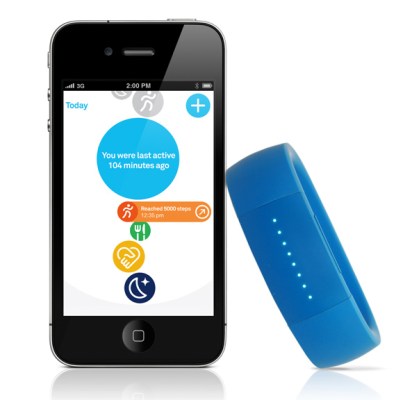After years of talk about wearable fitness devices, I’ve been seeing more and more of them in the past few months, especially Nike’s FuelBand. However, Julia Hu, CEO of startup Lark, says devices like the FuelBand aren’t really designed to meet the needs of everyday consumers — something she’s hoping to do with an upcoming product called Larklife.
Lark actually launched at TechCrunch Disrupt with a silent alarm product (which memorably prompted startup competition judge Sean Parker to ask, “Are you serious?”). Since then, the alarm has evolved into Lark Pro, a sleep monitoring and coaching service — the company says it has sold “tens of thousands” of its devices, and that 73 percent of insomniacs saw an improvement after using Lark Pro for a month.
Hu tells me that she sees Larklife and Lark Pro as “applications of the same method of coaching and tracking, but in different areas of your life.” So the company will continue to offer the sleep product, while also launching Larklife for consumers who are more interested in general wellness. Larklife is really a combination of three different products — a daytime wristband, a nighttime wristband, and an iOS app. Together, the system tracks basic fitness statistics (calories burned, distance traveled, steps taken), food eaten, and sleep.
Judging from the photos that Hu is showing off, the wristbands look pretty cool, and the company says they were designed by Ammunition, which also designed the Beats by Dre headphones. However, Hu argues that the real innovation is on the software side. That’s because existing fitness products are really designed for athletes, and present big, ambitious goals for things like calories burned, she says — if you don’t meet those goals, you’ve failed. Larklife, on the other hand, is designed to give users tips throughout the day, which they can act on in the moment. For example, if you don’t sleep as much as usual, it might point out that it’s particularly important to eat breakfast, and it will also congratulate you for accomplishments like walking 1,000 steps in one day.
As with Lark Pro, a lot of that advice is personalized depending on your behavior and your goals, and it’s developed in consultation with scientific advisors, including Dr. Baba Shiv, a neuroeconomist at Stanford; Dr. Jo Solet, a psychologist and sleep expert at Harvard; and Cheri Mah, a sleep coach to NBA, NFL, and NHL athletes.
Hu also points to lots of individual features that should make Larklife more accessible for non-athletes. For example, there’s the fact that there are two different wristbands — that should be easier to track, Hu says, because you’re always wearing one of them, and the other one is always charging. And there’s Larklife’s one-tap diet tracking. Instead of requiring you to keep a detailed food journal, you can just press the button on your wristband to indicate that you’re eating. You can add more details if you want later on, but Larklife can already provide some guidance based on the taps alone.
In addition to the three main tracking categories (fitness, diet, and sleep), Larklife is also collecting data about your stress and productivity. Over time, Hu says she wants the wristband to get “smarter and smarter,” so that, for example, it can tell whether you’re running or biking.
More details about availability will come later, but the company plans to release Larklife sometime this year for a price of $149.99, and you can pre-order the product on the Lark site.
